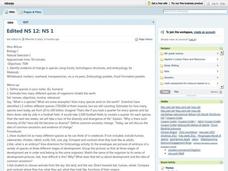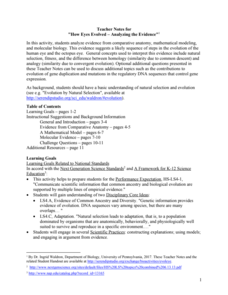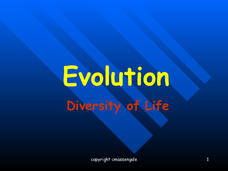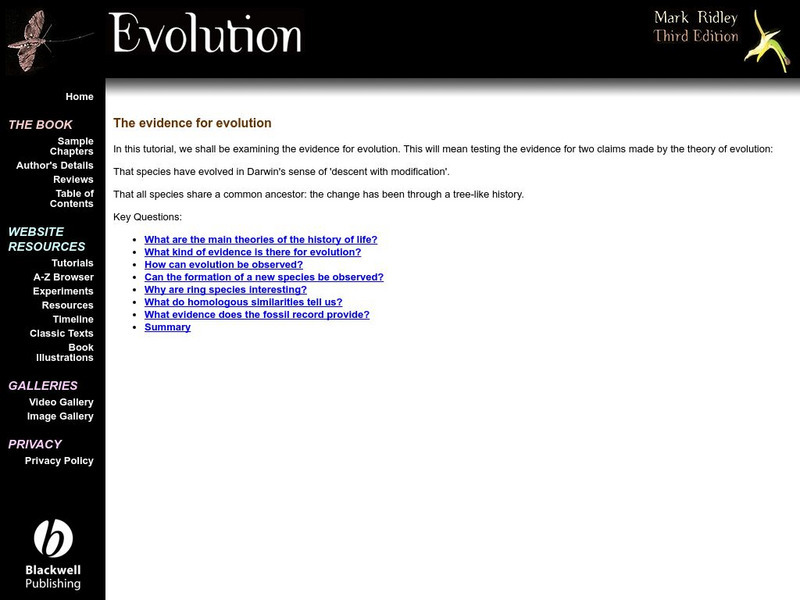Curated OER
Evidence of Evolution by Natural Selection
Being able to test a hypothesis is a scientific must. AP Biology pupils can see the process of hypothesis testing through evidence for evolution as seen in natural selection. Slides contain solid information and excerpts from academic...
Curated OER
Evidence of Evolution by Natural Selection: Testable Hypotheses #2
These slides will activate prior knowledge with real-life examples of natural selection. The predictions and outcomes for those examples are explained. Your students will like the information about the relevant chromosome tests that can...
Curated OER
Natural Selection
High schoolers estimate how many different species of organisms inhabit the Earth. In groups, they match the pictures of embryos at the different stages of development. They compare and contrast animals from the sky, land, and water...
Curated OER
Roots: The Ancestry of Modern People
High schoolers investigate the models for the origin of modern humans and the conditions that facilitate speciation and evolution. The classification and nomenclature of hominid species is also examined.
Curated OER
Evidence of Evolution by Natural Selection - Testable Hypotheses
The factors that affect selection and evolution are investigated here. Information about some common ancestry examples are given but with no real scientific evidence. This presentation is very obvious in making biased claims about...
California Academy of Science
Color Vision Genetics Evolution Simulation
At one point, all mammals carried only two color receptors, but now most humans carry three. An informative presentation and hands-on activity demonstrate how this evolved through genetics. By participating in the activity, pupils...
Curated OER
Evolution worksheet
Looking at evolution in detail, this thorough instructional activity has complex questions requiring details and explanations of natural selection and diversity. Various examples of biological characteristics are available, and students...
Curated OER
Learning Cycle Lesson Plan #6 (Misconception)
Ninth graders investigate evolution via natural selection and form an opinion. They support their opinion using scientific evidence and apply this to adaptations that have allowed certain organisms to survive.
Serendip
How Eyes Evolved – Analyzing the Evidence
Octopodes existed for hundreds of thousands of years before humans, yet our eyes share many similarities. Scholars analyze the evidence to determine if the evolution of eyes best fits a homology or analogy model. They discuss the issue...
Curated OER
Making Peace
Students examine how African societies view their family and ancestors and settle disputes. They create a spirit doll, and role-play conflict resolution using the ancestor figure dolls.
Biology Junction
Evolution – Diversity of Life
Scientists noticed animals with backbones share similar bone structure despite having different forms, such as fins, arms, and wings. Young scientists gain an appreciation for evolution by understanding the history of the theory. They...
Curated OER
Evidence for Evolution
In this evidence of evolution worksheet, students review notes given by referring to the Nelson Biology text, chapter 11/13. Students read the notes and the specified pages in the text.
Channel Islands Film
Island Rotation: Lesson Plan 4
Foster's Rule? Allopatric speciation? After watching West of the West's documentary Island Rotation, class members use Venn diagrams to compare endemic species on the Channel Islands with mainland related species. They then create a...
Howard Hughes Medical Institute
Stalking the Genetic Basis of a Trait
Need an a-maize-ing lesson to show your class how regulatory genes work? If you use the well-written resource, they'll be all ears! Biology scholars discover the gene responsible for the evolution of the modern-day corn plant through a...
Curated OER
Change Through Time
In this evolution worksheet, high schoolers will complete a table by writing in the era and biological event based on 4 different time periods of Earth's history. Students will answer 8 fill in the blank questions based on the different...
Curated OER
Biology Chapter 15 Word Search Puzzle
In this biology instructional activity, students look for the words that are related to the theme of the instructional activity. They also work on the skills of spelling and word recognition.
Curated OER
Hominoid Cranium Comparison
High schoolers describe, measure and compare cranial casts from contemporary apes (chimpanzees and gorillas, typically), modern humans and fossil "hominids" (erect and bipedal forms evolutionarily separated from apes).
Mocomi & Anibrain Digital Technologies
Mocomi: The Theory of Evolution
This slideshow provides a brief overview of Charles Darwin and his theory of evolution, natural selection and survival of the fittest.
University of California
University of California Museum of Paleontology: Homologies
These pages are from the Understanding Evolution website for teachers. They focus on homologous structures that organisms with common ancestors share.
Other
The Evidence for Evolution
These pages are part of a site called "Evolution," that accompanies a textbook by the same name. Mark Ridley is the author, and in this section he discusses the evidence for evolution.
Wonderville Media
Wonderville: Charles Darwin
Charles Darwin was born in England on February 12, 1809. He was a "naturalist," best known for his theories of evolution. Darwin collected evidence that all life on Earth "evolved" from a common ancestry. He studied the process of...
Curated OER
Educational Technology Clearinghouse: Clip Art Etc: Charles Darwin
An English naturalist who established that all species of life have descended over time from common ancestry. He proposed the theory of natural selection and evolution.




















